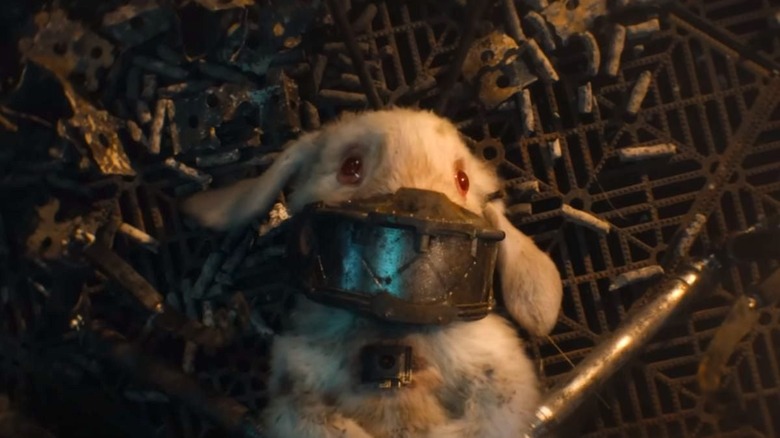GOTG 3: James Gunn Received An Award From PETA For His Depiction Of Animal Testing
The brutal animal abuse scenes in "Guardians of the Galaxy Vol. 3" have been a divisive topic among people who've seen the movie. While the sequel sides with the animals and portrays their abuser, High Evolutionary (Chukwudi Iwuji), as an evil villain, the scenes showcasing Rocket's backstory as a test subject are difficult to watch. At the same time, these horrifying moments are arguably necessary for highlighting the cruelty that animals have to endure as part of drug testing.
PETA has shown its support for James Gunn's latest Marvel space opera in a new press release. The organization has given the director a "Not a Number" award for depicting Rocket's origin story in a way that showcases the horrors of animal cruelty, and the statement praised Gunn for giving an identity and personality to the countless animals who are exposed to abuse in laboratories.
The statement also credited "Guardians of the Galaxy Vol. 3" for its overall message regarding animal testing. "PETA is celebrating this as the best animal rights film of the year for helping audiences see animals as individuals and suggesting that just because we can experiment on them doesn't mean that we should," PETA Senior Vice President Lisa Lange said. Additionally, the animal rights organization praised the film for spotlighting animal testing cruelty in a realistic manner.
Lylla, Floor, and Teefs' fates reflect the reality of animal testing
While "Guardians of the Galaxy Vol.3" depicts talking animals in a sci-fi setting, PETA explained that the movie does portray what test subject animals have to endure in an honest light. In the movie, High Evolutionary kills Floor, Lylla, and Teefs after they've served their purpose in his experiments, and this aspect of the film is true to life.
According to the aforementioned statement, animal testing often entails the subjects being forced to live alone, in the dark, and behind cages. On top of that, the animals are purposely exposed to diseases, mutilation, and other horrifying practices without receiving any pain relief afterward. When the experiments are over, the subjects are killed and the cycle continues.
The PETA statement also notes that 95% of the drugs that emerge from animal testing fail to pass human clinical trials as they're either ineffective or harmful to people. However, the National Institutes of Health spends $20 billion per year on animal testing, and their funding comes from the taxpayer.

